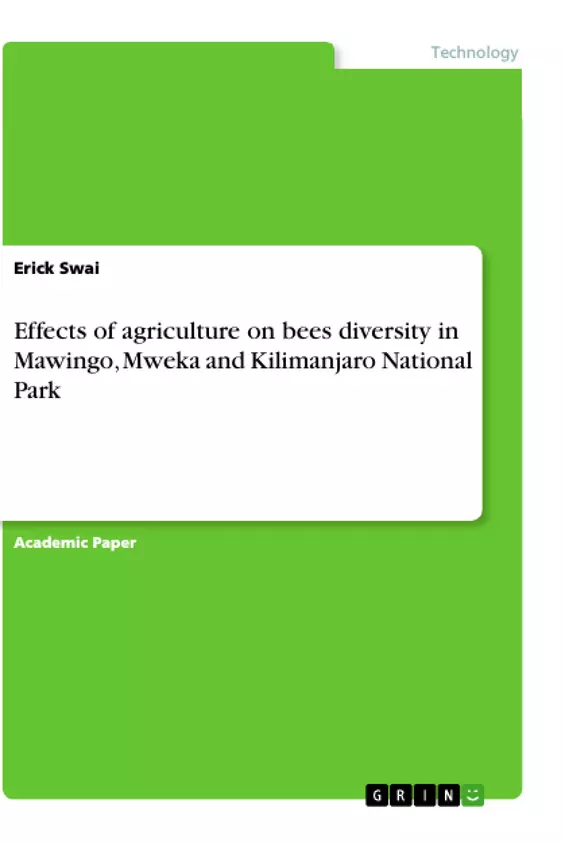The research will offer information on bees and the commencement of future actions on conservation of bees in Tanzania and the world at large.
In order to provide good pollination service at high rate, Bee needs a favorable environment and or area that is free from agricultural products such as pesticides, fertilizers also free from diseases and trampling which will provide a pollination service that is effective. In addition the environment should not be overly cost for bee diversity.
Increase in human population has led to the high demand for food; the high demand for food by human has led to the ongoing increase in farm size with specialization leading to the reduction of natural vegetation areas for food production.
If the agricultural areas will continue to be treated with pesticides and fertilizers, farmers will be wasting their time because the bee diversity will keep on declining and later on the pollination service will be poorly performed that will result to poor productivity of crops. Also bees suffering can lead to a total disappearance of bees hence lack pollination services completely.
Keywords: Agriculture, Diversity, Biodiversity, pollinators, Intensive
Inhaltsverzeichnis (Table of Contents)
- INTRODUCTION
- Background information
- Problem Statement and justification
- Objectives
- General objective
- Specific objective
- Hypothesis
- METHODOLOGY
- Study area description
- Geographical Location
- Climate
- Vegetation
Zielsetzung und Themenschwerpunkte (Objectives and Key Themes)
This study investigates the impact of agricultural intensification on bee diversity in the Kilimanjaro region of Tanzania. The primary goal is to determine the effect of varying levels of agricultural practices on bee abundance and diversity. This research aims to contribute to the understanding of bee conservation in Tanzania and beyond.
- The effect of agricultural intensification on bee diversity
- The impact of different agricultural practices on bee abundance and diversity
- The importance of bee diversity for ecosystem services
- The role of habitat loss and fragmentation in bee decline
- The need for conservation strategies to protect pollinators
Zusammenfassung der Kapitel (Chapter Summaries)
- INTRODUCTION: This chapter provides background information on the importance of bees as pollinators, highlights the decline of bee populations globally, and introduces the specific research question of this study. It addresses the problem statement and justification for investigating the impact of agriculture on bee diversity in the Kilimanjaro region.
- METHODOLOGY: This chapter describes the study area, including its geographical location, climate, and vegetation. It provides details on the sampling methods used to collect data on bee diversity across different agricultural intensity levels.
Schlüsselwörter (Keywords)
This study focuses on the key themes of agriculture, bee diversity, biodiversity, pollinators, agricultural intensification, habitat loss, and bee conservation. The research investigates the impact of different agricultural practices on bee abundance and diversity, aiming to contribute to the understanding of bee conservation in Tanzania and beyond.
Frequently Asked Questions
How does agriculture affect bee diversity in Tanzania?
Agricultural intensification, including the use of pesticides and fertilizers, leads to a decline in bee diversity and abundance. This can result in poor pollination services and reduced crop productivity.
Why is bee diversity important for the ecosystem?
Bees are essential pollinators. High bee diversity ensures effective pollination services, which are critical for the reproduction of many plants and the success of agricultural crops.
Where was this study conducted?
The research took place in Mawingo, Mweka, and the Kilimanjaro National Park in Tanzania, examining different levels of agricultural intensity in these areas.
What are the main threats to bees mentioned in the research?
The primary threats include pesticides, fertilizers, habitat loss due to farm expansion, diseases, and physical trampling in agricultural areas.
What happens if bee populations disappear?
A total disappearance of bees would lead to a complete lack of pollination services, causing a collapse in the productivity of various crops and natural vegetation.
What is the goal of bee conservation actions in Tanzania?
The goal is to create favorable environments free from harmful chemicals and habitat fragmentation, ensuring that bee diversity is protected to maintain vital ecosystem services.
- Citation du texte
- Erick Swai (Auteur), 2021, Effects of agriculture on bees diversity in Mawingo, Mweka and Kilimanjaro National Park, Munich, GRIN Verlag, https://www.grin.com/document/1139045



